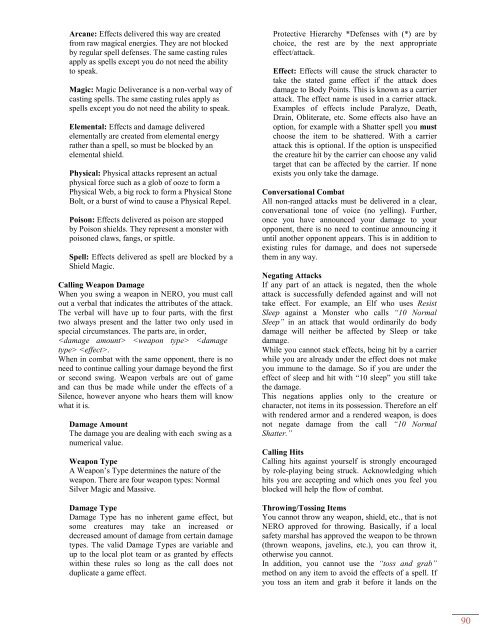You also want an ePaper? Increase the reach of your titles
YUMPU automatically turns print PDFs into web optimized ePapers that Google loves.
Arcane: Effects delivered this way are created<br />
from raw magical energies. They are not blocked<br />
by regular spell defenses. The same casting rules<br />
apply as spells except you do not need the ability<br />
to speak.<br />
Magic: Magic Deliverance is a non-verbal way <strong>of</strong><br />
casting spells. The same casting rules apply as<br />
spells except you do not need the ability to speak.<br />
Elemental: Effects and damage delivered<br />
elementally are created from elemental energy<br />
rather than a spell, so must be blocked by an<br />
elemental shield.<br />
Physical: Physical attacks represent an actual<br />
physical force such as a glob <strong>of</strong> ooze to form a<br />
Physical Web, a big rock to form a Physical Stone<br />
Bolt, or a burst <strong>of</strong> wind to cause a Physical Repel.<br />
Poison: Effects delivered as poison are stopped<br />
by Poison shields. They represent a monster with<br />
poisoned claws, fangs, or spittle.<br />
Spell: Effects delivered as spell are blocked by a<br />
Shield Magic.<br />
Calling Weapon Damage<br />
When you swing a weapon in NERO, you must call<br />
out a verbal that indicates the attributes <strong>of</strong> the attack.<br />
The verbal will have up to four parts, with the first<br />
two always present and the latter two only used in<br />
special circumstances. The parts are, in order,<br />
.<br />
When in combat with the same opponent, there is no<br />
need to continue calling your damage beyond the first<br />
or second swing. Weapon verbals are out <strong>of</strong> game<br />
and can thus be made while under the effects <strong>of</strong> a<br />
Silence, however anyone who hears them will know<br />
what it is.<br />
Damage Amount<br />
The damage you are dealing with each swing as a<br />
numerical value.<br />
Weapon Type<br />
A Weapon’s Type determines the nature <strong>of</strong> the<br />
weapon. There are four weapon types: Normal<br />
Silver Magic and Massive.<br />
Damage Type<br />
Damage Type has no inherent game effect, but<br />
some creatures may take an increased or<br />
decreased amount <strong>of</strong> damage from certain damage<br />
types. The valid Damage Types are variable and<br />
up to the local plot team or as granted by effects<br />
within these rules so long as the call does not<br />
duplicate a game effect.<br />
Protective Hierarchy *Defenses with (*) are by<br />
choice, the rest are by the next appropriate<br />
effect/attack.<br />
Effect: Effects will cause the struck character to<br />
take the stated game effect if the attack does<br />
damage to Body Points. This is known as a carrier<br />
attack. The effect name is used in a carrier attack.<br />
Examples <strong>of</strong> effects include Paralyze, Death,<br />
Drain, Obliterate, etc. Some effects also have an<br />
option, for example with a Shatter spell you must<br />
choose the item to be shattered. With a carrier<br />
attack this is optional. If the option is unspecified<br />
the creature hit by the carrier can choose any valid<br />
target that can be affected by the carrier. If none<br />
exists you only take the damage.<br />
Conversational Combat<br />
All non-ranged attacks must be delivered in a clear,<br />
conversational tone <strong>of</strong> voice (no yelling). Further,<br />
once you have announced your damage to your<br />
opponent, there is no need to continue announcing it<br />
until another opponent appears. This is in addition to<br />
existing rules for damage, and does not supersede<br />
them in any way.<br />
Negating Attacks<br />
If any part <strong>of</strong> an attack is negated, then the whole<br />
attack is successfully defended against and will not<br />
take effect. For example, an Elf who uses Resist<br />
Sleep against a Monster who calls “10 Normal<br />
Sleep” in an attack that would ordinarily do body<br />
damage will neither be affected by Sleep or take<br />
damage.<br />
While you cannot stack effects, being hit by a carrier<br />
while you are already under the effect does not make<br />
you immune to the damage. So if you are under the<br />
effect <strong>of</strong> sleep and hit with “10 sleep” you still take<br />
the damage.<br />
This negations applies only to the creature or<br />
character, not items in its possession. Therefore an elf<br />
with rendered armor and a rendered weapon, is does<br />
not negate damage from the call “10 Normal<br />
Shatter.”<br />
Calling Hits<br />
Calling hits against yourself is strongly encouraged<br />
by role-playing being struck. Acknowledging which<br />
hits you are accepting and which ones you feel you<br />
blocked will help the flow <strong>of</strong> combat.<br />
Throwing/Tossing Items<br />
You cannot throw any weapon, shield, etc., that is not<br />
NERO approved for throwing. Basically, if a local<br />
safety marshal has approved the weapon to be thrown<br />
(thrown weapons, javelins, etc.), you can throw it,<br />
otherwise you cannot.<br />
In addition, you cannot use the “toss and grab”<br />
method on any item to avoid the effects <strong>of</strong> a spell. If<br />
you toss an item and grab it before it lands on the<br />
90


